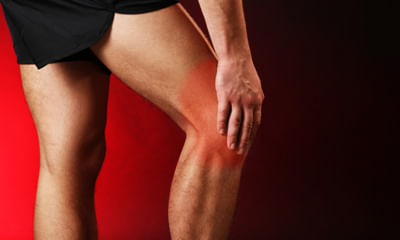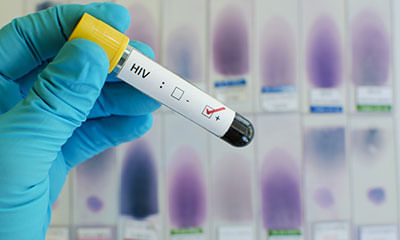How Do People Get Infected With Hiv
What is anemia? What tests are the required for anemia? What is iron deficiency? What is b12 deficiency? How iron and b1 ...
Ask Free Question
Hi Anemia is a condition in which you lack enough healthy red blood cells to carry adequate oxygen to your body's tissues. Having anemia, also referred to as low hemoglobin, can make you feel tired and weak. There are many forms of anemia, each with its own cause. Anemia can be temporary or long term and can range from mild to severe. In most cases, anemia has more than one cause. See your doctor if you suspect that you have anemia. It can be a warning sign of serious illness. Symptoms Anemia signs and symptoms vary depending on the cause and severity of anemia. Depending on the causes of your anemia, you might have no symptoms. Signs and symptoms, if they do occur, might include: Fatigue Weakness Pale or yellowish skin Irregular heartbeats Shortness of breath Dizziness or lightheadedness Chest pain Cold hands and feet Headaches Iron deficiency anemia. This most common type of anemia is caused by a shortage of iron in your body. Your bone marrow needs iron to make hemoglobin. Without adequate iron, your body can't produce enough hemoglobin for red blood cells. Without iron supplementation, this type of anemia occurs in many pregnant women. It's also caused by blood loss, such as from heavy menstrual bleeding; an ulcer in the stomach or small bowel; cancer of the large bowel; and regular use of some pain relievers that are available without a prescription, especially aspirin, which can cause inflammation of the stomach lining resulting in blood loss. It's important to determine the source of iron deficiency to prevent recurrence of the anemia. Vitamin deficiency anemia. Besides iron, your body needs folate and vitamin B-12 to produce enough healthy red blood cells. A diet lacking in these and other key nutrients can cause decreased red blood cell production. Some people who consume enough B-12 aren't able to absorb the vitamin. This can lead to vitamin deficiency anemia, also known as pernicious anemia. Anemia of inflammation. Certain diseases — such as cancer, HIV/AIDS, rheumatoid arthritis, kidney disease, Crohn's disease and other acute or chronic inflammatory diseases — can interfere with the production of red blood cells. Aplastic anemia. This rare, life-threatening anemia occurs when your body doesn't produce enough red blood cells. Causes of aplastic anemia include infections, certain medicines, autoimmune diseases and exposure to toxic chemicals. Anemias associated with bone marrow disease. A variety of diseases, such as leukemia and myelofibrosis, can cause anemia by affecting blood production in your bone marrow. The effects of these types of cancer and cancer-like disorders vary from mild to life-threatening. Hemolytic anemias. This group of anemias develops when red blood cells are destroyed faster than bone marrow can replace them. Certain blood diseases increase red blood cell destruction. You can inherit a hemolytic anemia, or you can develop it later in life. Sickle cell anemia. This inherited and sometimes serious condition is a hemolytic anemia. It's caused by a defective form of hemoglobin that forces red blood cells to assume an abnormal crescent (sickle) shape. These irregular blood cells die prematurely, resulting in a chronic shortage of red blood cells. you can consult for more information
I had sex with two girls at different times in the span of one month. Both the girls don't have any other partner. Is it ...
Ask Free Question
Hello- having unprotected sex with multiple sexual partners (msp) is the greatest risk factor for human immunodeficiency virus (hiv) and other sexually transmitted infections (stis) among youths. Young people with msps are less likely to use a condom and the greater the risk for stis.
Why my foot is burning sensation and also pain it too much how can I relief this situation I am diabetic patient. ...
Ask Free Question
If you are suffering from burning pain or tingling sensation in hands or feet; sharp shooting pain in legs; numbness in hands or feet, then you might be suffering from neuropathic pain. Burning pain in feet •neck pain/low back pain/glutei pain •vit. B12 deficiency •chemotherapy for cancer patients •post-herpes virus infection •post-spine surgery •post-amputation •diseases like spinal cord injury, multiple sclerosis, hiv, lead toxicity, etc. Feet burning sensation a burning sensation in your feet may be caused by nerve damage in the legs, also called neuropathy. Although many medical conditions can cause burning feet, diabetesis the most common. Most burning feet treatments focus on preventing further nerve damage and reducing pain. Causes of burning feet most often, neuropathy is the cause of burning feet. Damaged nerve fibers are more likely to become overactive and misfire. The damaged nerves send pain signals to the brain even though there is no wound. In most people with neuropathy, the leg nerves become damaged first. These people often have tingling and numbness in the feet as well. Many people complain that their feet are overly sensitive to touch (hyperesthesia) and can have varying degrees of burning pain. It can range from mild to disabling. Diabetes and alcohol abuse are by far the most common causes of neuropathy in the legs. Many other conditions can cause neuropathy or a burning sensation in the feet: besides neuropathy, infections and inflammation of the feet can also cause a burning sensation. The most common of these is athlete's foot, an infection of the skin caused by fungus. Peripheral artery disease (pad) also commonly causes burning feet. The poor circulation of blood to the feet may frequently cause pain, tingling, and burning feet, especially while walking. •chronic kidney disease (uremia) •small fiber neuropathy •vitamin deficiency (vitamin b12, folate, and occasionally vitamin b6) •alcohol abuse •low thyroid hormone levels (hypothyroidism) •lyme disease •hiv/aids •amyloid polyneuropathy •drug side effects, including chemotherapy drugs, vitamin b6 overdose, hiv medicines, amiodarone, isoniazid, metformin, and others •erythromelalgia •heavy metal poisoning (lead, mercury, arsenic) •vasculitis (inflammation of bloodvessels) •sarcoidosis •guillain-barre syndrome (gbs) •chronic inflammatory demyelinating polyneuropathy (cidp) •always use the footwear of proper fitting and which is comfortable. •always use socks. Never use shoes without socks. •after a long day work, it is advisable to stretch and also to ice your feet. •provide rest to your feet as much as you can. •avoid the use of alcohol or any narcotic items. •acupuncture or magnetic therapy shall be done whenever possible to keep the nerves active. •follow all the instructions as given by the doctor. Burning foot painburning foot pain is a common complaint, usually as a result of damage to the nerves of the foot or leg. It may develop due to an injury or medical condition either of which can cause compression of the nerves. Our nerves are the structures that carry messages to and from the brain. They tell our muscles when and how to work and are responsible for sensation including pressure and temperature. Damage to the nerves affects how these signals are transmitted. Burning type symptoms may be constant or come and go, vary in intensity and be accompanied by other sensations such as pins and needles or numbness. It all depends on what is causing the problem. Causes of burning foot painaccurate diagnosis of burning foot pain is vital to ensure appropriate treatment is started as soon as possible to prevent further damage. Here we will look at the most common causes of burning pain in feet, how they present, what causes them and how they are treated. Treatmentcold water foot baths, vitamin b supplements, comfortable footwear (mcr chapelles)
I am suffering from burning sensation in my whole body, it started with feet and slowly it reached whole body. It burns ...
Ask Free Question
If you are suffering from burning pain or tingling sensation in hands or feet; sharp shooting pain in legs; numbness in hands or feet, then you might be suffering from neuropathic pain. What is a neuropathic pain? Neuropathic pain is a special type of pain which occurs when there is damage to nerve fibres, which produces tingling or burning type of pain. It is of two types: 1. Peripheral neuropathic pain: it occurs when there is an injury to peripheral nerve fibres (a-delta or c-fibers) which carries pain sensation to the brain (thalamus) for interpretation. 2. Central neuropathic pain: it occurs due to sensitization of central pain interpreting mechanisms (thalamus) to falsely feel pain when peripheral nerve fibres are no longer sending pain impulses to them. Worldwide-estimates of the prevalence of neuropathic pain is 7% i.e. 7 persons out of 100 people are suffering from different types of neuropathic pain. Symptoms: •tingling sensation or feeling of ants crawling under skin •burning sensation •sharp shooting pain or electric current-like sensation •stabbing pain •dull pain with numbness or heaviness reasons for neuropathic pain: •diabetes mellitus: most common cause worldwide due to uncontrolled blood sugar levels, causing damage to nerve fibres. •alcohol consumption/cigarette smoking: damage to nerve fibres or damage to blood vessels supplying nerve fibres. Burning pain in feet •neck pain/low back pain/glutei pain •vit. B12 deficiency •chemotherapy for cancer patients •post-herpes virus infection •post-spine surgery •post-amputation •diseases like spinal cord injury, multiple sclerosis, hiv, lead toxicity, etc.
I feel abnormal sense in my left feet. Like blood obstructions. When we seat for long tike some sensation working our le ...
Ask Free Question
If you are suffering from burning pain or tingling sensation in hands or feet; sharp shooting pain in legs; numbness in hands or feet, then you might be suffering from neuropathic pain. What is a neuropathic pain? Neuropathic pain is a special type of pain which occurs when there is damage to nerve fibres, which produces tingling or burning type of pain. It is of two types: 1. Peripheral neuropathic pain: it occurs when there is an injury to peripheral nerve fibres (a-delta or c-fibers) which carries pain sensation to the brain (thalamus) for interpretation. 2. Central neuropathic pain: it occurs due to sensitization of central pain interpreting mechanisms (thalamus) to falsely feel pain when peripheral nerve fibres are no longer sending pain impulses to them. Worldwide-estimates of the prevalence of neuropathic pain is 7% i.e. 7 persons out of 100 people are suffering from different types of neuropathic pain. Symptoms: •tingling sensation or feeling of ants crawling under skin •burning sensation •sharp shooting pain or electric current-like sensation •stabbing pain •dull pain with numbness or heaviness reasons for neuropathic pain: •diabetes mellitus: most common cause worldwide due to uncontrolled blood sugar levels, causing damage to nerve fibres. •alcohol consumption/cigarette smoking: damage to nerve fibres or damage to blood vessels supplying nerve fibres. Burning pain in feet •neck pain/low back pain/glutei pain •vit. B12 deficiency •chemotherapy for cancer patients •post-herpes virus infection •post-spine surgery •post-amputation •diseases like spinal cord injury, multiple sclerosis, hiv, lead toxicity, etc.
My hiv tests duo combo 4 th generation antigen and antibody test at 44 th day of exposure is negative also antibody elis ...
Ask Free Question
Good evening lybrate-user ji. Any person who is infected with hiv can be diagnosed after 21-28 days of exposure with a simple antibody test. In people who are hiv infected, all most all of them will be diagnosed with in 3 months and virtually all of them by 6 months. So in your case, as of now you are free from hiv but I advice you to repeat one last time after 180 days of exposure. 4th generation duo combo kits are well advanced and they are being used in all blood banks to test donated blood for immediate result of hiv status. The swolen lymphnodes on neck and armpit you have mentioned are may be due to other sti like syphilis etc. And flu maybe due to your partner's airway infection. Your physician might got tested you with vdrl test which will ruleout the status of syphilis of which the reports you have not provided. Hence I request you to stay calm and get treatment for all other complications and please get tested for hiv one last time after 180 mdays since exposure. I have more than 10 years experience treating hiv disease and please contact if you still need further assistance.
Are people living with hiv (with undetectable viral load) eligible for prp hair treatment? ...
Ask Free Question
No, because being undetectable doesn’t mean that your viral load (number of virus copies in the blood) is zero, just that it is so low that it cannot be measured with most tests. The reason why even the modern and very effective antiretroviral drugs cannot cure hiv infection is that there are still copies of the virus hiding in certain cells that even a combination of medications cannot eradicate. If a patient stops taking arvs his or her viral load will soon begin to rise again.* regardless of a person's viral load, an hiv positive person will always have antibodies present in their blood. Antibodies are produced by the body in response to an infection, and it is the presence of these that are (typically) used to test for hiv.
Did genital herpes change in to hiv? My friend have hsv 1&2igg---14 and hsv 1&2----0.6. ...
Ask Free Question
I understand your query. I advice you to go for private consultation as it will help me to give you better advice and suggestion, if you have any issue in booking the online consultation do let me know. Genital herpes, caused by the herpes simplex virus type 2 (hsv-2), is one of the most common sexually transmitted infections worldwide. It is also associated with a 2- to 3-fold increased risk for hiv infection. Some people infected with hsv-2 suffer from recurring sores and breaks in genital skin
What is maximum time period it takes for hiv symptoms to show in anyone body after infection? ...
Ask Free Question
I am sorry to hear about your concern but will be happy to assist you. Primary hiv symptoms may show up 2 to 4 weeks after initial exposure. They can last for several weeks. However, some people may only have symptoms for a few days. Let's connect over a call so that we can discuss your concern in details and make a suitable treatment plan for you.
Hello sir, my age is 24. I am male. I am participate sex with only one girl and she has a vagina infection. I licked her ...
Ask Free Question
I am sorry to hear about your concern but will be happy to assist you. Infection with hiv can cause a sore throat, as well as other flu-like symptoms like fever, chills, muscle aches, fatigue, and an "hiv rash" (“hiv” stands for human immunodeficiency virus). In people who are hiv-positive, a fungal infection known as oral thrush can also cause a prolonged sore throat. Let's connect over a call so that we can discuss your concern in details and make a suitable treatment plan for you.







